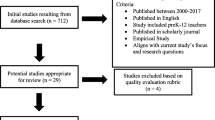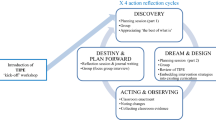Abstract
This project explores how one early childhood preparation program integrated applied ethics in introductory coursework. Recognizing that students enter teacher education with well-formed values and beliefs regarding children and teaching, carefully planned learning experience and encounters in real life learning contexts expand their understanding of the complexity of ethical decision-making in early care and education programs. This project documents students’ perspectives toward their role as meaning-makers through the analysis of assignments intended to promote reflection on values. As students engage with course content and gain practical experience, their knowledge and beliefs regarding teaching evolve together demonstrating the power of ethical thinking in enhancing early childhood teacher education. The findings indicate that students draw on their image of children, social justice, and self-awareness in their development of a professional ethical identity.
Similar content being viewed by others
References
Brophy-Herb, H., Kostelnik, M., & Stein, L. (2001). A Developmental approach to teaching about ethics using the NAEYC code of ethical conduct. Young Children, 56(1), 80–84.
Castle, K. (2004). The meaning of autonomy in early childhood teacher education. Journal of Early Childhood Teacher Education, 25(1), 3–10.
Clawson, M., & Shinn, M. (2000). Developing student field experiences through university/community collaborations. Journal of Early Childhood Teacher Education, 21(1), 65–74.
Cummings, R., Dyas, L., Maddux, C., & Kochman, A. (2001). Principled moral reasoning and behavior of pre service teacher education students. American Educational Research Journal, 38(1), 143–158.
Curtis, D. (2004). Creating invitations for learning. Child Care Information Exchange, 135, 38–40.
Dahlberg, G., & Moss, P. (2005). Ethics and politics in early childhood education. New York and London: Routledge Falmer.
Dahlberg, G., Moss, P., & Pence, A. (1999). Beyond quality in early childhood education and care. London: Routledge.
Dalli, C. (2008). Pedagogy, knowledge and collaboration: Towards a ground-up perspective on professionalism. European Early Childhood Education Research Journal, 16(2), 171–185.
Dorsey, A. (1999). Strategies for developing understanding of professional ethical behavior in clinical and field situations. Journal of Early Childhood Teacher Education, 20(2), 189–192.
Dunn, M. (2003). Putting the child first: How one student teacher negotiated the moral landscape of teaching. Journal of Early Childhood Teacher Education, 24(1), 51–60.
Fassler, R. (2000). Teacher education students’ understandings of developmentally appropriate practice in the real world: Analysis and implications. Journal of Early Childhood Teacher Education, 21(3), 355–364.
Feeney, S., Freeman, N., & Moravcik, E. (2000). Teaching the NAEYC Code of ethical conduct activity sourcebook. Washington, DC: NAEYC.
Fenech, M. (2006). The impact of regulatory environments on early childhood professional practice and job satisfaction: A review of conflicting discourses. Australian Journal of Early Childhood, 31(2), 49–57.
Fleer, M. (2003). Early childhood education as an evolving ‘community of practice’ or as lived ‘social reproduction’: Researching the taken for granted. Contemporary Issues in Early Childhood, 4(1), 64–79.
Freire, P. (1997). Mentoring the mentor: A critical dialogue with Paulo Freire, Counter points (Vol. 60). New York, NY: Peter Lang.
Goodfellow, J. (2003). Practical wisdom in professional practice: The person in the process. Contemporary Issues in Early Childhood, 4(1), 48–63.
Grayling, A. C. (2003). What is good/the search for the best way to live. London: Phoenix.
Groundwater-Smith, S., & Sachs, J. (2002). The activist professional and reinstatement of trust. Cambridge Journal of Education, 32(3), 341–358.
Hostetler, K. (1997). Ethical judgment in teaching. Boston: Allyn & Bacon.
Howe, K. R. (1993). The liberal democratic tradition and educational ethics. In K. A. Strike & P. L. Ternasky (Eds.), Ethics for professionals in education (pp. 27–42). New York, NY: Teachers College Press.
Johnston, J. S. (2008). Does a sentiment-based ethics of caring improve upon a principles-based one? The problem of impartial morality. Educational Philosophy and Theory, 40(3), 436–452.
Lyons, N. (1990). Dilemmas of knowing: Ethical and epistemological dimensions of teacher’s work and development. Harvard Educational Review, 60, 159–181.
McNair, S., Sullivan, R., & Hill, D. (2002). Beyond the comfort zone: A curriculum and assessment “immersion” experience in graduate early childhood teacher education. Journal of Early Childhood Teacher Education, 23(1), 11–18.
National Association for the Education of Young Children. (2005). NAEYC code of ethical conduct. Washington, DC: NAEYC.
Newman, L. (2002). Making the hard decisions: Student teachers moving towards ethical judgment. Journal of Early Childhood Teacher Education, 23(1), 19–26.
Newman, L., & Coombe, K. (1999). Facing the hard questions: Ethics for early childhood fieldwork programs. Australian Journal of Early Childhood, 24(2), 35–39.
Noddings, N. (1984). Caring: a feminine approach to ethics and moral education. Berkeley, CA: University of California Press.
Stein, J. G. (2001). The cult of efficiency. Toronto, ON: Anansi.
Strike, K., & Soltis, J. (1985). Ethics of teaching. New York, NY: Teachers College Press.
Taguchi, H. (2007). Deconstructing and transgressing the theory-practice dichotomy in early childhood education. Educational Philosophy and Theory, 39(3), 275–290.
Tirri, K. (1999). Teachers’ perceptions of moral dilemmas at school. Journal of Moral Education, 28(1), 31–47.
Tirri, K. & Husu, J. (2000). Uncovering a relational epistemology of ethical dilemmas in early childhood education. Paper presented at the annual meeting of the American Educational Research Association.
Tronto, J. C. (1993). Moral boundaries: A political argument for an ethic of care. New York, NY: Routledge.
Ungaretti, T., Dorsey, A., Freeeman, N., & Bologna, T. (1997). A teacher education ethics initiative: A collaborative response to a professional need. Journal of Teacher Education, 48(4), 271–280.
Vasconcelos, T. (2006). Children’s spaces as sites for ethical practices: A ‘School-as-a Tree’ in an economically impoverished neighbourhood. International Journal of Early Years Education, 14(2), 169–182.
Woodrow, C., & Busch, G. (2008). Repositioning early childhood leadership as action and activism. European Early Childhood Education Research Journal, 16(1), 83–93.
Author information
Authors and Affiliations
Corresponding author
Rights and permissions
About this article
Cite this article
Giovacco-Johnson, T. Applied Ethics as a Foundation in Early Childhood Teacher Education: Exploring the Connections and Possibilities. Early Childhood Educ J 38, 449–456 (2011). https://doi.org/10.1007/s10643-010-0428-7
Published:
Issue Date:
DOI: https://doi.org/10.1007/s10643-010-0428-7




